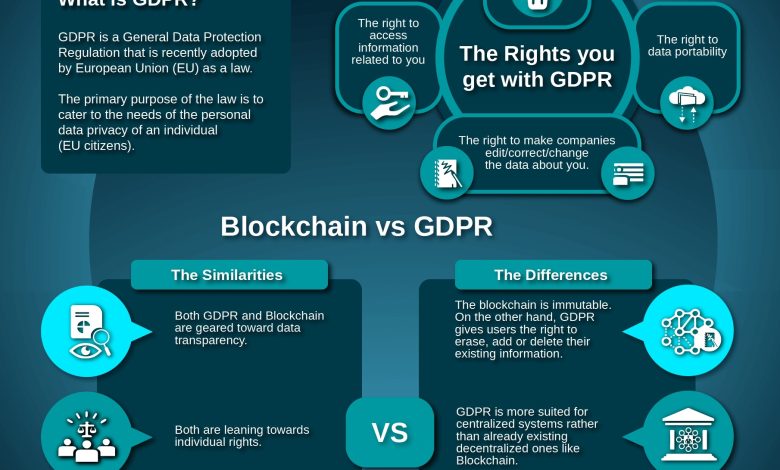Crypto and GDPR: What You Need to Know

- Understanding the impact of GDPR on the crypto industry
- Key principles of GDPR that crypto companies must adhere to
- Navigating the challenges of GDPR compliance in the crypto space
- How GDPR is reshaping data protection in the world of cryptocurrency
- Ensuring data privacy in the age of blockchain technology and GDPR
- Best practices for managing personal data in compliance with GDPR for crypto businesses
Understanding the impact of GDPR on the crypto industry
The General Data Protection Regulation (GDPR) has had a significant impact on the crypto industry, affecting how companies in this sector handle personal data. Under GDPR, crypto businesses must ensure that they are transparent about how they collect, store, and process user data. Failure to comply with GDPR regulations can result in hefty fines, which is why it is crucial for crypto companies to understand and adhere to these rules.
One of the key aspects of GDPR that crypto businesses need to be aware of is the concept of data minimization. This means that companies should only collect the data that is necessary for the purpose for which it is being processed. In the crypto industry, where user privacy is paramount, this is particularly important. Companies must also ensure that they have the necessary security measures in place to protect user data from breaches or unauthorized access.
Another important consideration for crypto businesses is the right to erasure, also known as the right to be forgotten. This means that individuals have the right to request that their personal data be deleted if there is no compelling reason for a company to continue processing it. Crypto companies must have processes in place to respond to these requests in a timely manner to comply with GDPR.
Overall, GDPR has forced the crypto industry to take data privacy and security more seriously. By understanding and implementing the requirements of GDPR, crypto businesses can build trust with their users and avoid the potential consequences of non-compliance. It is essential for companies in this sector to stay informed about any updates or changes to GDPR regulations to ensure that they remain in compliance and protect user data effectively.
Key principles of GDPR that crypto companies must adhere to
The General Data Protection Regulation (GDPR) imposes key principles that crypto companies must adhere to in order to ensure compliance with data protection laws. These principles are designed to protect the personal data of individuals and promote transparency in data processing activities.
- Lawfulness, fairness, and transparency: Crypto companies must process personal data lawfully, fairly, and in a transparent manner. This means that individuals must be informed about how their data is being used and have the right to access and control their personal information.
- Purpose limitation: Personal data collected by crypto companies must be used for specified, explicit, and legitimate purposes. Any further processing of the data must be compatible with these purposes.
- Data minimization: Crypto companies should only collect personal data that is necessary for the purposes for which it is being processed. They should also ensure that the data is accurate and kept up to date.
- Accuracy: It is essential for crypto companies to ensure that the personal data they hold is accurate and, where necessary, kept up to date. Inaccurate data should be rectified or erased without delay.
- Storage limitation: Personal data should not be kept for longer than is necessary for the purposes for which it is being processed. Crypto companies must establish appropriate retention periods for different types of data.
- Integrity and confidentiality: Crypto companies must implement appropriate security measures to protect personal data from unauthorized access, disclosure, alteration, or destruction. This includes encryption, access controls, and regular security audits.
- Accountability: Crypto companies are responsible for demonstrating compliance with GDPR principles. They must keep records of their data processing activities, conduct data protection impact assessments, and appoint a data protection officer if required.
Navigating the challenges of GDPR compliance in the crypto space
When it comes to navigating the challenges of GDPR compliance in the crypto space, there are several key considerations that companies operating in this industry must keep in mind. One of the main challenges is ensuring that personal data is handled in a way that is compliant with the GDPR regulations. This means that companies must be transparent about how they collect, store, and use personal data, as well as obtain explicit consent from individuals before processing their data.
Another challenge is the issue of data security. The GDPR requires companies to implement appropriate security measures to protect personal data from unauthorized access, disclosure, alteration, and destruction. This is particularly important in the crypto space, where the risk of data breaches and cyber attacks is higher due to the nature of the industry.
Furthermore, companies in the crypto space must also consider the cross-border transfer of personal data. The GDPR imposes restrictions on the transfer of personal data outside of the European Economic Area (EEA) to ensure that data is adequately protected. This can be a complex issue for companies in the crypto space, as data is often transferred across borders as part of normal business operations.
In order to navigate these challenges effectively, companies in the crypto space should conduct a thorough assessment of their data processing activities and implement appropriate policies and procedures to ensure GDPR compliance. This may involve appointing a data protection officer, conducting regular data protection impact assessments, and providing training to staff on GDPR requirements.
How GDPR is reshaping data protection in the world of cryptocurrency
The General Data Protection Regulation (GDPR) has had a significant impact on the world of cryptocurrency, reshaping how data protection is approached in this industry. Cryptocurrency exchanges and wallet providers now have to comply with strict regulations to ensure the privacy and security of user data.
Under GDPR, cryptocurrency companies must obtain explicit consent from users before collecting any personal information. This includes data such as names, email addresses, and financial details. Additionally, users have the right to access the data collected about them and request its deletion if they wish.
GDPR has forced many cryptocurrency businesses to reevaluate their data protection practices and implement robust security measures to prevent data breaches. Failure to comply with GDPR can result in hefty fines, which has made data protection a top priority for companies operating in the cryptocurrency space.
Ensuring data privacy in the age of blockchain technology and GDPR
Ensuring data privacy in the age of blockchain technology and GDPR is crucial for businesses operating in the crypto space. With the rise of blockchain technology and the implementation of the General Data Protection Regulation (GDPR), companies must navigate the complex landscape of data privacy laws to protect their users’ personal information.
One of the key challenges in data privacy in the crypto industry is the decentralized nature of blockchain technology. While blockchain technology offers security and transparency, it also presents challenges when it comes to compliance with GDPR. Companies must ensure that they are able to protect personal data while still maintaining the integrity of the blockchain network.
One way to address these challenges is through the use of privacy-enhancing technologies such as zero-knowledge proofs and homomorphic encryption. These technologies allow companies to secure personal data on the blockchain while still complying with GDPR regulations. By implementing these solutions, companies can protect their users’ privacy and build trust in the crypto ecosystem.
Best practices for managing personal data in compliance with GDPR for crypto businesses
When it comes to managing personal data in compliance with GDPR for crypto businesses, there are several best practices that should be followed to ensure that data protection regulations are met. These practices include:
- Obtaining explicit consent from individuals before collecting any personal data.
- Implementing robust security measures to protect personal data from unauthorized access.
- Regularly updating privacy policies to reflect any changes in data processing practices.
- Providing individuals with the ability to access, correct, or delete their personal data upon request.
- Training employees on data protection best practices and the importance of GDPR compliance.
By following these best practices, crypto businesses can ensure that they are handling personal data in a responsible and compliant manner, which will help build trust with their customers and avoid potential fines for non-compliance with GDPR regulations.



